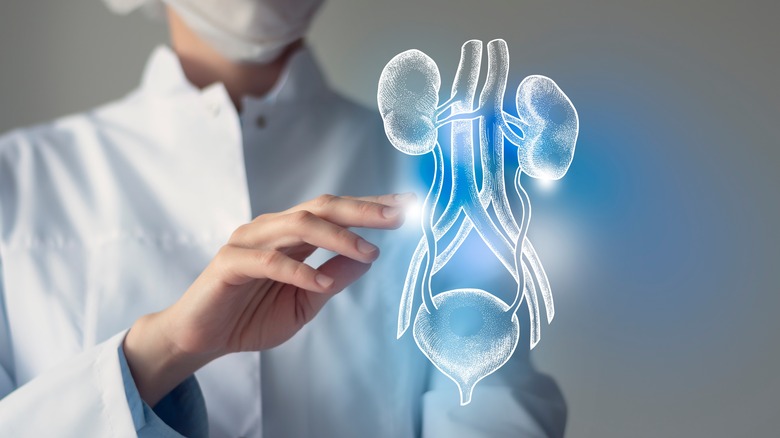Why UTIs Can Frequently Happen During Pregnancy
A urinary tract infection (UTI) is an infection that affects any part of the urinary system, which includes the kidneys, bladder, ureters, and urethra, per Mayo Clinic. According to the clinic, the symptoms of a UTI can vary depending on which part of the urinary tract is affected. However, common symptoms include (but aren't limited to) a strong need to pee, a burning feeling when urinating, and passing urine frequently in small amounts. You might also feel pain or pressure in the lower abdomen (or pelvic area). In some cases, there may be no symptoms at all, says the clinic.
UTIs are typically caused by bacteria, most commonly E. coli, which is a type of bacteria that normally lives in the large intestine, says WebMD. The bacteria can enter the urinary tract through the urethra and travel up to the bladder, where they can multiply and cause an infection, per the source
Urinary tract infections (UTIs) are relatively common during pregnancy. It's important to take care of urinary tract infections as soon as possible, especially during pregnancy, as left untreated, these infections can cause serious complications for both the mother and the baby. Some complications include preterm labor, pyelonephritis, and low birth weight, per Medscape.
Why are UTIs common during pregnancy?
There are a few reasons why UTIs are more common during pregnancy. The first is due to hormonal changes. During pregnancy, the body produces more progesterone. This can cause the muscles in the bladder and urethra to relax, per a 2022 article published in the journal StatPearls. This can make it more difficult for the bladder to empty completely, explains WebMD. According to the source, these hormones can cause changes in the urinary tract. This can trigger a condition called vesicoureteral reflux, in which urine can flow back inside the kidneys from the bladder, increasing the risk of infection.
As the uterus expands, it can also place pressure on the bladder, making it more difficult for urine to flow out of the body, says Healthline. According to the source, the increased bladder volume and enlarged urinary tract can cause urine to become trapped in the bladder, increasing the risk of infection. Generally speaking, women are more likely to get UTIs since their urethra is generally shorter compared to men. This makes it easier for bacteria to travel from the anus to the urinary tract (via the Mayo Clinic).
How are UTIs treated during pregnancy?
The treatment of urinary tract infections (UTIs) during pregnancy involves the use of antibiotics. This is similar to the treatment for UTIs in non-pregnant individuals. The most common antibiotics used to treat UTIs during pregnancy include penicillin or ampicillin which are used for 3 to 7 days, per WebMD. These antibiotics are considered safe for use during pregnancy and are often the first-line treatment for UTIs during pregnancy. However, although a drug of choice, E. coli is becoming increasingly resistant to ampicillin (via the American Family Physician). Nitrofurantoin is also considered safe for use during pregnancy, but it is typically avoided in the third trimester, since it can interfere with your baby's red blood cells, according to the National Health Services (NHS).
It's important to complete the full course of antibiotics as prescribed by your healthcare provider, even if your symptoms improve before the medication is finished, in order to make sure that the infection is completely gone. It might also help to practice good hygiene habits like wiping from front to back after urination and bowel movements, avoiding irritating feminine products, wearing cotton underwear, and staying hydrated, per WebMD.



